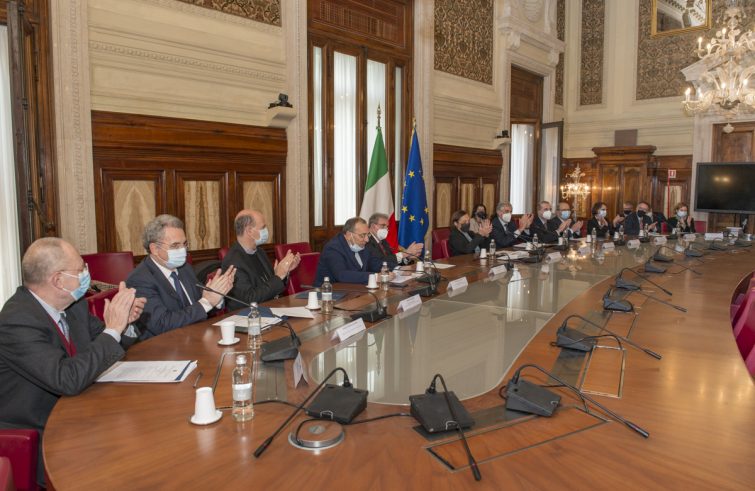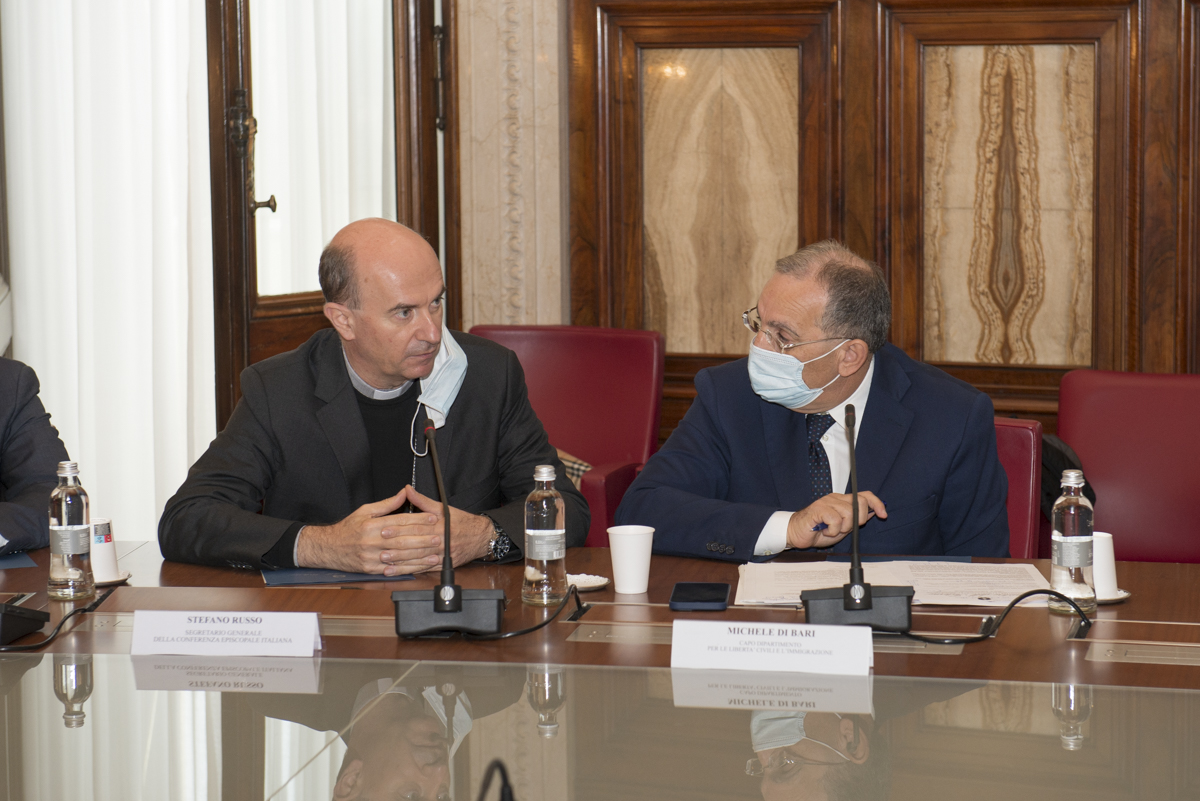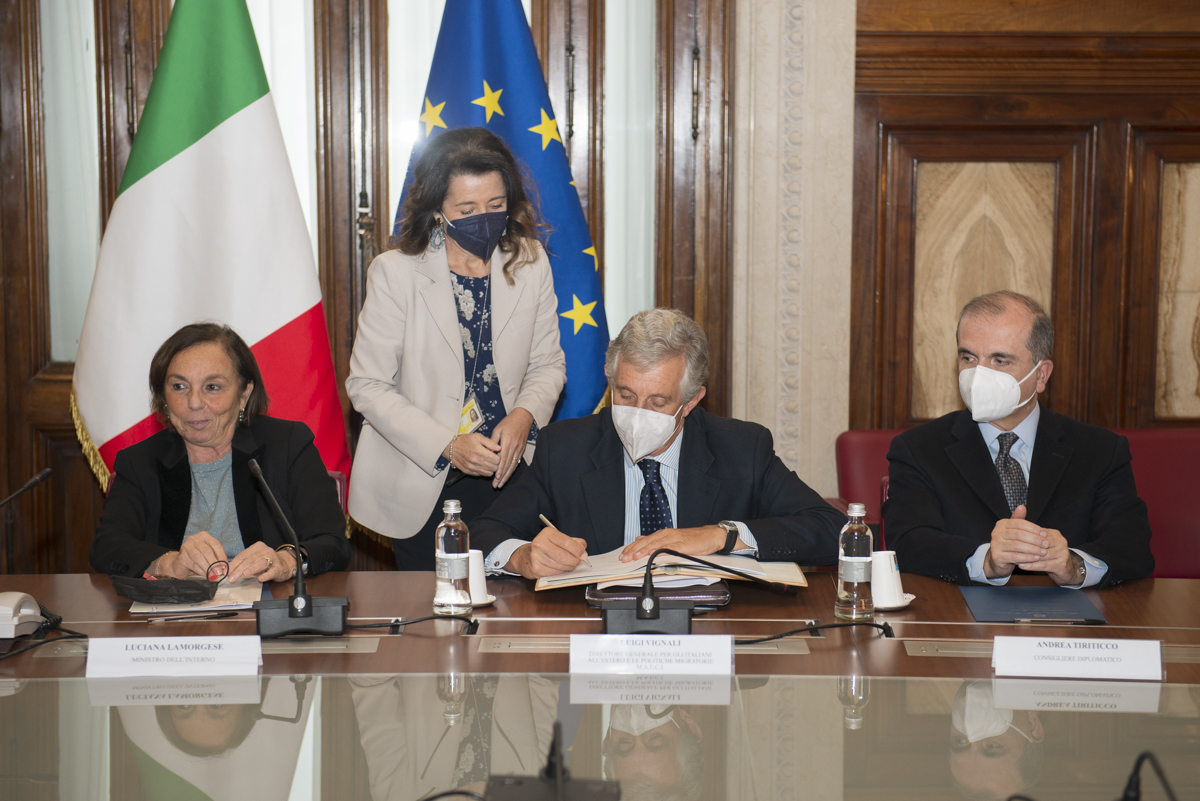
Thanks to an agreement between the Ministry of Interior and the Foreign Ministry a Memorandum of Understanding was signed providing for the safe and legal entry of 1,200 Afghan citizens in clear need of international protection over a two-year period, extendable to 36 months. The agreement was signed by the Italian Bishops’ Conference, the Community of Sant’Egidio, the Federation of Evangelical Churches, the Waldensian Table, ARCI, INMP and UNHCR, alongside the two ministries. During the signing ceremony today, Prefect Michele Di Bari, director of the Interior Ministry’s Civil Liberties and Immigration Department, announced that the Italian Bishops’ Conference will take charge of 300 migrants, the Community of Sant’Egidio of 200 migrants, the Waldensian Table and the Federation of Evangelical Churches in Italy 200 migrants, and ARCI 100 migrants, while the Interior Ministry, which is also handling air transport, will be responsible for 400 migrants.
“It thus represents a major humanitarian effort,” said Prefect Di Bari, voicing the hope that the project could soon “be expanded” to include up to 2,000 refugees.
“The project,” the Italian Bishops’ Conference said in a statement, “will be further implemented in Pakistan and Iran, and in other first asylum/transit countries. The refugees who will be under the care of the Italian Catholic Church will be housed in various dioceses where they will receive support from the local Caritas agencies for their integration and inclusion. “When the Afghan crisis broke out,” said Msgr. Stefano Russo, Secretary General of the Italian Bishops’ Conference (CEI) in his speech at the ceremony for the signing of the agreement, “our thoughts went to the humanitarian corridors as a means of showing our closeness to this population.” Italian bishops have been running the humanitarian corridors project since 2017, providing “a legal option to over a thousand people from Ethiopia, Niger, Turkey and Jordan”, thanks to Caritas Italy. “Humanitarian corridors provide a safe route for people forced to flee their homeland,” said Msgr Russo. He added:
“These signatures, this very simple deed, are the result of previous and ongoing efforts that will involve many others. Let us hope it may spread as good news and involve an increasing number of European countries.”
 “Italy is a country with a clear humanitarian vocation,” said the president of the Community of Sant’Egidio Marco Impagliazzo. “This corridor originates from an overwhelming concern of the Italian people during the month of August, when the tragic images of the evacuation of Afghan citizens from Afghanistan were released.”
“Italy is a country with a clear humanitarian vocation,” said the president of the Community of Sant’Egidio Marco Impagliazzo. “This corridor originates from an overwhelming concern of the Italian people during the month of August, when the tragic images of the evacuation of Afghan citizens from Afghanistan were released.”
“We wished to respond to this large movement to ensure that no one is forgotten: those who stayed behind and those who managed to flee to neighbouring countries.”
“The humanitarian corridors ensure a legal path to reception and integration”, said from the floor the newly appointed president of the Federation of Evangelical Churches, Daniele Garrone. He highlighted the synergy between the State and the Churches in promoting and supporting the humanitarian corridors plan, with the hope that it may become “a good practice for the whole of Europe”, in the awareness that migration is not “a temporary emergency” but ” a phenomenon marking epochal transformations.”
 Interior Minister Luciana Lamorgese called for “a more inclusive Europe, more responsible, more concerned with the problems that cannot be borne only by certain States.” “Rescue operations are ongoing in Lybia”, she explained. NGO- vessels are rescuing numerous migrants. I would like to say: it is only right that these people be saved, but it’s unfair that only Italy is involved. It’s highly unfair since this burden cannot be imposed on one country only because it’s the first port of call. Minister Lamorgese asked Europe, and in particular the European Union, for “a fair redistribution.”
Interior Minister Luciana Lamorgese called for “a more inclusive Europe, more responsible, more concerned with the problems that cannot be borne only by certain States.” “Rescue operations are ongoing in Lybia”, she explained. NGO- vessels are rescuing numerous migrants. I would like to say: it is only right that these people be saved, but it’s unfair that only Italy is involved. It’s highly unfair since this burden cannot be imposed on one country only because it’s the first port of call. Minister Lamorgese asked Europe, and in particular the European Union, for “a fair redistribution.”
“A redistribution not only of people but also of responsibilities according to the principle of solidarity, which should be the cornerstone of European integration.”


